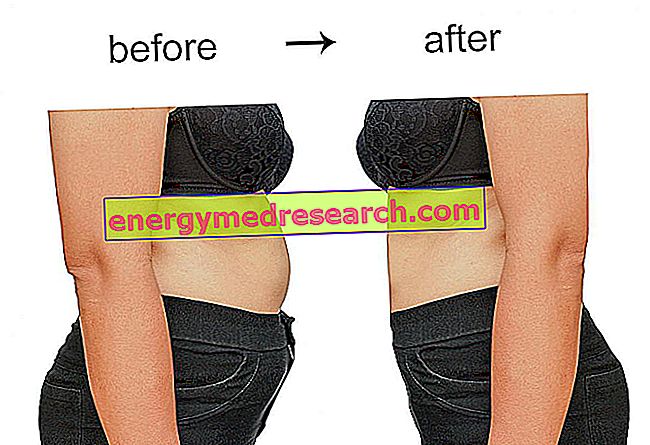
Once and for all, it would be useful to understand if slimming diets, to be effective, must be low in fat or low in carbohydrates.
In reality, the diet that favors the reduction of body weight is simply less energetic than a normal diet. In light of the fact that both fats, carbohydrates and proteins provide calories, the slimming diet should proportionally limit all three macronutrients.
There are also quite important differences concerning the metabolic impact of the various molecules (even within the same chemical category).
Carbohydrates are generally considered the most useful for the supply of energy and are indispensable for some tissues that cannot use fats; on the other hand, they have a rather pronounced insulin-stimulating effect (therefore also fattening). Obviously, this characteristic is emphasized by the general abuse of the population towards the foods that contain them (in Italy, especially pasta). It is also necessary to point out that, among the various types of carbohydrates, some are more stimulating (glucose and dextrins) and others less (fructose and galactose or polymers that contain them); moreover, also the molecular complexity (polymeric or monomeric fomra) plays a very important role for insulin release.
The same goes for proteins and lipids. The first, which look like real "chains", perform many biological functions; these, once digested and absorbed, vary their impact on the fattening hormone (insulin) based on the type of amino acids that compose them. Similarly, triglycerides differentiate according to the fatty acids they contain; these, in the human body, carry out (from the quantitative point of view) mainly the task of energy reserve, filling the adipose tissue. Proteins and fats stress insulin secretion less than carbohydrates even if, as far as lipids are concerned, they constitute a "ready to use" deposit substrate (from the blood, directly into the adipocytes).
NB . The use of amino acids and lipids for energy purposes, in the absence (or almost) of carbohydrates, determines the accumulation of toxic molecules called ketones. These, potentially harmful to the body's tissues, must not be present in excessive quantities and / or for long periods. Their effect on the nervous system is of the anorexygen type, which is why their accumulation in the blood is sometimes intentionally induced.
An experimental work in 2013, entitled " Very low-carbohydrate ketogenic diet VS low-fat diet for long-term weight loss: a meta-analysis of randomized controlled trials ", tried to determine which was the most suitable nutritional strategy for weight loss : low carbohydrate (ketogenic) or low fat content.
The meta-analysis tried to verify if the subjects who underwent a VLCKD (<50g of carbohydrates per day), and the subjects who faced a Low Fat Diet (LFD, <30% of the total energy) obtained and maintained weight loss and reduction of cardiovascular risk factors in the long term.
In August 2012, from the bibliographic sources: MEDLINE, CENTRALE, ScienceDirect, Scopus, Lillà, SciELO, ClinicalTrials.gov and databases of scientific literature, studies have been extrapolated (without discrimination of date and nationality) with the characteristics desirable for the meta-analysis in question. These requirements are: randomization and sample of adults who followed a VLCKD or an LFD (with 12 months or more follow-up).
The primary parameter of the study was the evaluation of body weight; the secondary ones instead: TG (triglycerides), HDL cholesterol (HDL-C), LDL cholesterol (LDL-C), systolic and diastolic pressure, glycaemia, insulinemia, HbA1c levels (glycated hemoglobin) and C-reactive protein.
In the overall analysis, five studies of thirteen revealed significant results.
Subjects who followed a VLCKD found a decrease in body weight (1415 subjects), a decrease in TG (1258 patients) and a decrease in diastolic pressure (1298 individuals); while an increase in HDL cholesterol (1257 patients) and LDL cholesterol (1255 individuals) occurred.
It emerged that, in the long term, people with a VLCKD achieved greater weight loss than those with LFD; ultimately, VLCKD can be considered a potential tool in the fight against obesity.
Data in hand, the ketogenic diet makes it possible to lose weight not only in the short term, but also in the long term; however, can distorting nutrition to allow you to lose weight really the right choice? Probably not.
It would instead be desirable for people to remain healthy through a balanced diet. On the other hand, in conditions of obesity and metabolic diseases, the priority aspect is linked only to weight loss (often, even urgently required).



